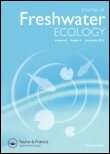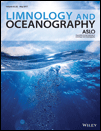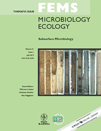
Biogeosciences
Scope & Guideline
Fostering discoveries at the crossroads of ecology and earth sciences.
Introduction
Aims and Scopes
- Biogeochemical Cycles:
Research related to the cycling of carbon, nitrogen, phosphorus, and other nutrients through terrestrial and aquatic ecosystems, emphasizing how these cycles are influenced by human activities and natural processes. - Ecosystem Dynamics:
Studies that investigate the interactions between living organisms and their environments, focusing on how these relationships affect ecosystem health, resilience, and function. - Climate Change Impact:
Papers that explore the effects of climate change on biogeochemical cycles and ecosystem processes, including shifts in species distribution, changes in productivity, and alterations in nutrient cycling. - Microbial Ecology:
Research on microbial communities and their roles in biogeochemical processes, particularly in relation to soil health, water quality, and ecosystem functioning. - Remote Sensing and Modeling:
Utilization of remote sensing technologies and modeling approaches to assess and predict biogeochemical dynamics and ecosystem responses to environmental changes.
Trending and Emerging
- Ecosystem Resilience and Restoration:
An increasing emphasis on understanding ecosystem resilience and restoration strategies in the face of climate change and anthropogenic impacts, focusing on practical applications for ecosystem management. - Carbon Sequestration and Storage:
A growing interest in the mechanisms and potential of carbon sequestration in various ecosystems, including forests, wetlands, and agricultural lands, as a vital strategy for climate change mitigation. - Microbial Contributions to Biogeochemistry:
Emerging research highlighting the critical role of microbial processes in biogeochemical cycling, particularly in relation to greenhouse gas emissions and soil health. - Impact of Extreme Weather Events:
A trend towards studying the effects of extreme weather events, such as droughts and floods, on biogeochemical processes and ecosystem functioning, reflecting growing concerns about climate variability. - Technological Advances in Monitoring:
The integration of new technologies, such as remote sensing and machine learning, to enhance monitoring and modeling of biogeochemical processes across different ecosystems.
Declining or Waning
- Paleoecological Studies:
While still relevant, there has been a noticeable decline in the number of studies focused specifically on paleoecological reconstructions, as contemporary ecological and biogeochemical research takes precedence. - Geochemical Proxies:
Research utilizing geochemical proxies for environmental reconstruction has waned, possibly due to advancements in molecular techniques and a shift towards direct measurements and modeling. - Traditional Soil Chemistry:
There is a declining focus on conventional soil chemistry studies, as the field moves towards integrated approaches that combine soil biology, chemistry, and physical processes.
Similar Journals

ECOSYSTEMS
Connecting research to real-world ecological solutions.ECOSYSTEMS, an esteemed journal published by SPRINGER, stands at the forefront of ecological research with a distinguished Q1 quartile ranking in multiple categories, including Ecology, Evolution, Behavior and Systematics, and Environmental Chemistry for 2023. Founded in 1998, the journal has become crucial for advancing our understanding of ecosystem dynamics and interactions, offering researchers a platform to disseminate significant findings relevant to ecological health and sustainability. Although Open Access is not available, the journal maintains a robust reputation, evidenced by its high Scopus rankings—placing it within the top 10% in diverse ecological domains. With a publication scope that spans fundamental and applied aspects of ecosystems, ECOSYSTEMS serves as an essential resource for professionals and students pursuing innovative ecological solutions, making it indispensable for contributing to the global conversation on environmental sustainability. For more information, please visit the publisher's site or access your institution's library resources.

BIOGEOCHEMISTRY
Illuminating the pathways of biogeochemical processes across ecosystems.BIOGEOCHEMISTRY is an esteemed journal published by Springer, dedicated to advancing the understanding of biogeochemical processes across a range of ecosystems. Since its inception in 1984 and continuing into its converged trajectory through 2024, the journal has established itself as a critical resource in the fields of Earth-Surface Processes, Environmental Chemistry, and Water Science and Technology. With a prestigious Q1 ranking across these categories as of 2023, it ranks among the top journals in its field, reflecting its significant impact on current research and knowledge dissemination. Researchers, professionals, and students alike can benefit from the journal's rigorous peer-reviewed articles that contribute vital insights and innovative research findings. Although currently not an open-access journal, BIOGEOCHEMISTRY remains a leading platform for sharing high-quality scientific work that addresses pressing environmental challenges.

ECOLOGICAL RESEARCH
Advancing ecological understanding through rigorous research.ECOLOGICAL RESEARCH is a prestigious academic journal published by WILEY, dedicated to advancing the field of ecology and its associated disciplines. Since its inception in 1986, the journal has consistently provided a platform for high-quality, peer-reviewed research, contributing significantly to the understanding of ecological systems and their complexities. With an impressive 2023 impact factor reflected in its Q1 ranking in the category of Ecology, Evolution, Behavior, and Systematics, it stands among the top journals in its field, as evidenced by its Scopus rank of #192 out of 721 and placement in the 73rd percentile. While accessible through standard subscription models, this journal plays an essential role in disseminating crucial findings and innovative methodologies to researchers, professionals, and students alike. With a commitment to fostering ecological knowledge and collaboration, ECOLOGICAL RESEARCH continues to influence ecological practices and policies, shaping the future of research in this critical area.

JOURNAL OF FRESHWATER ECOLOGY
Championing open access to aquatic science insights.JOURNAL OF FRESHWATER ECOLOGY, published by Taylor & Francis Inc, is an esteemed source of research dedicated to advancing the understanding of freshwater ecosystems. Established in 1981, this Open Access journal has provided a platform for innovative studies and groundbreaking articles relevant to the fields of Aquatic Science and Ecology. With its HIndex reflecting a commitment to quality scholarship, the journal is currently classified in the Q3 category for both Aquatic Science and Ecology, Evolution, Behavior and Systematics, indicating its respectable impact within these disciplines. The journal ranks within the 45th percentile in Ecology and the 41st percentile in Aquatic Science on Scopus, highlighting its relevance to a global audience of researchers and practitioners. By facilitating unrestricted access to research findings since 2017, JOURNAL OF FRESHWATER ECOLOGY aims to enrich our understanding of freshwater systems and their conservation, making it an essential resource for those invested in ecological research and environmental sustainability.

LIMNOLOGY AND OCEANOGRAPHY
Empowering Scholars to Influence Policy and ConservationLimnology and Oceanography is a premier peer-reviewed journal published by Wiley that has been at the forefront of aquatic sciences since its inception in 1956. With an impressive impact factor placing it in Q1 in both Aquatic Science and Oceanography categories, this journal showcases cutting-edge research and studies relevant to the dynamics of freshwater and marine ecosystems. Limnology and Oceanography serves as a vital platform for researchers, professionals, and students to disseminate their findings and foster a deeper understanding of aquatic environments. The journal does not currently offer open access, but it provides a unique opportunity for scholars to contribute to a body of work that influences policy, conservation efforts, and the scientific community at large. With its substantial ranking in Scopus as #12 in Aquatic Science and #9 in Oceanography, Limnology and Oceanography remains a critical resource for advancing knowledge in these vital fields.

Inland Waters
Advancing Sustainable Solutions for Inland WatersInland Waters, published by TAYLOR & FRANCIS LTD, stands as a prestigious scholarly journal dedicated to the critical examination of freshwater ecosystems and their management. With an ISSN of 2044-2041 and an E-ISSN of 2044-205X, this journal boasts a remarkable Q1 ranking in both Aquatic Science and Water Science and Technology for 2023, reflecting its significant impact in the field. Researchers and professionals can benefit from its comprehensive coverage of cutting-edge research, methodological advancements, and policy implications concerning inland waters. Committed to disseminating valuable knowledge in a vital area of environmental science, Inland Waters aims to foster collaboration and promote innovative solutions for sustainable water management practices. As it continues through its converged years from 2012 to 2024, the journal remains an essential resource for those dedicated to advancing our understanding and stewardship of freshwater environments worldwide.

International Journal of Limnology
Innovating Insights into Inland WatersThe International Journal of Limnology, published by EDP SCIENCES S A, is a cutting-edge journal dedicated to the field of aquatic sciences, with a strong emphasis on limnology—the study of inland waters. Headquartered in France, the journal serves as a vital resource for scholars and practitioners alike, aiming to advance the understanding of freshwater ecosystems and their management. With an e-ISSN of 2823-1465 and classified within the Q3 category of the 2023 Aquatic Science quartiles, it occupies a significant niche in academic research, ranking 150 out of 247 in Scopus listings. The journal’s open access policy ensures that research findings are widely disseminated, facilitating collaboration and innovation across global aquatic science communities. Published continuously from 2022 to 2024, the International Journal of Limnology aspires to contribute to sustainable practices and enhance ecological understanding, making it an essential publication for researchers, professionals, and students committed to the stewardship of aquatic resources.

Limnology and Oceanography Letters
Illuminating the depths of freshwater and marine science.Limnology and Oceanography Letters, published by WILEY, is an esteemed peer-reviewed journal dedicated to advancing our understanding of freshwater and marine systems. With an impressive Q1 ranking in both Aquatic Science and Oceanography, this journal has established itself as a pivotal resource for researchers, professionals, and students alike. Since its inception as an Open Access journal in 2016, it has provided unrestricted access to high-quality, innovative research articles that illuminate diverse aspects of aquatic ecosystems and their dynamics. With a publication history from 2016 to 2024 and a significant presence in Scopus rankings—placing it in the top 6% for Oceanography and the top 8% for Aquatic Science, this journal not only fosters scholarly communication but also encourages interdisciplinary collaboration. Addressing pressing issues related to water resource management, climate impact, and ecological integrity, Limnology and Oceanography Letters remains essential for those dedicated to the science of aquatic environments.

Forest Ecosystems
Navigating the complexities of forest ecosystems.Forest Ecosystems is a prestigious open access journal published by KEAI PUBLISHING LTD, dedicated to advancing knowledge in the fields of forestry, ecology, and conservation. Established in 2014 and located in Beijing, China, this journal has rapidly gained prominence, achieving Q1 status in multiple categories, including Ecology, Evolution, Behavior and Systematics, and Forestry in 2023. With an impressive rank of 19 out of 174 in the Scopus category of Agricultural and Biological Sciences - Forestry, it stands in the 89th percentile, reflecting its influential contributions to the field. The journal fosters scholarly discourse and disseminates innovative research aimed at understanding forest ecosystems and their vital role in our environment. Offering a robust platform for researchers, professionals, and students, Forest Ecosystems ensures accessibility through its open access format, enabling a wider audience to engage with and benefit from cutting-edge research dedicated to the stewardship of forest resources.

FEMS MICROBIOLOGY ECOLOGY
Exploring the Intricacies of Microbial EcosystemsFEMS Microbiology Ecology is a prestigious journal published by Oxford University Press, specializing in the dynamic field of microbiology and its ecological implications. With an impressive impact factor and consistently ranked in the top quartiles (Q1) across multiple categories—including Applied Microbiology and Biotechnology, Ecology, and Microbiology—this journal serves as an essential resource for researchers and professionals aiming to advance their understanding of microbial interactions within ecosystems. Established in 1990 and spanning to 2024, FEMS Microbiology Ecology delivers cutting-edge research, reviews, and insightful discussions that illuminate the complex roles microorganisms play in environmental health and sustainability. Located in the United Kingdom, this journal provides a global platform for discourse, making significant contributions to both theoretical frameworks and practical applications in the biotech and environmental science sectors. Researchers and students alike will find a wealth of information that not only enriches their knowledge but also inspires innovative solutions for ecological challenges.